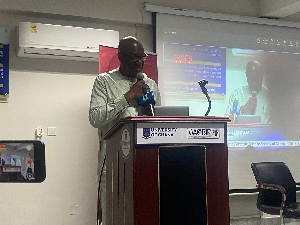Special Security Advisor to the President, Prosper Douglas Kweku Bani, has called for the enactment of comprehensive forensic legislation to modernise crime investigations in Ghana, stressing that scientific evidence must be backed by strong legal and ethical frameworks to ensure credibility, transparency and public trust in the justice system.
Delivering a keynote address at the inaugural session of the Ghana Academy of Forensic Sciences (GAFS), on September 6, 2025, at the University of Ghana, Bani underscored the urgency of bridging Ghana’s traditional investigative approaches with cutting-edge forensic innovations.
“Forensic evidence, while powerful, must be subject to strict legal and ethical frameworks,” he said.
He added that Ghana must “enact and enforce legislation that governs forensic practice, sets standards for evidence collection and preservation and safeguards the rights and privacy of citizens.”
Burnt, mutilated bodies of 8 retrieved from helicopter crash scene
Prosper Bani also noted that traditional detective work and community intelligence gathering remain valuable, but evolving crime patterns spanning cybercrime, organised networks and transnational threats demand forensic innovations such as DNA analysis, digital forensics and biometric identification.
He announced that the government has proposed the establishment of two state-of-the-art forensic laboratories to enhance investigative capacity, backed by resource allocation, policy direction and international partnerships.
Referencing the recent Z-9 helicopter crash in Ghana, Biney emphasised how forensic science is indispensable for both technical investigations and humanitarian efforts such as victim identification.
“Families who lose loved ones look to the justice system for certainty, closure and dignity.
“Only scientific precision can deliver these outcomes,” he said.
Dr Pet-Paul Wepeba, President of GAFS, called for the creation of a National Forensic Science Agency to oversee laboratory operations, establish national intelligence databases and regulate evidence handling standards.
Other speakers, including Dr Paul Ossei Poku Sampene, Fellow of the German Society of Pathology, highlighted both progress and persisting gaps in Ghana’s forensic infrastructure.
“Financial constraints and the absence of a national forensic regulator hinder the development of the specialty,” Dr Sampene warned.
Ohene-Djan, lecturer in Human Anatomy and Cell Biology, pushed for expanded forensic science programmes at Ghanaian universities, continuous professional training and stronger collaboration between security agencies and academia.
AM/AE
GhanaWeb’s latest documentary, Sex for Fish, that explores the plights of teenage girls in coastal communities, all in an attempt to survive, is out. Watch it below:



